Mennonite families set sights on farming in Kent County, put offer on 1,000 acres
Service commission hopes the move promotes revitalization of agriculture in the area
Old Order Mennonite families from southern Ontario have placed an offer on about 1,000 acres of land in Kent County, where there is hope the new community will bolster efforts to revitalize agriculture.
Paul Lang, the CEO of the Kent Regional Service Commission, said the commission has been working for five years on a project to bring Mennonite or Amish communities to the area.
"We thought this was a great opportunity for us to bring back agriculture in a region that [valued] agriculture for the last century," he said.
Lang said three Mennonite families from Lucknow, Ont., have confirmed their intentions to come to New Brunswick and are confident others will follow. He said six families are needed to officially create a Mennonite community.
 Paul
Lang, CEO of the Kent Regional Service Commission, says three Mennonite
families have confirmed their intention to come to New Brunswick and
are confident others will follow. (Nicolas Steinbach/Radio-Canada)
Paul
Lang, CEO of the Kent Regional Service Commission, says three Mennonite
families have confirmed their intention to come to New Brunswick and
are confident others will follow. (Nicolas Steinbach/Radio-Canada)
The land the farming families want to buy is on Richard Village Road in Acadieville, known locally as North Branch. He said everything should be finalized early in the new year.
Lang said more education of Kent County residents will be needed about who the Mennonites are and how they live their lives. But since the official move might not come until late 2024 or early 2025, there's time to do that.
Although many Mennonites today are part of a more mainstream culture, the members of the Old Order group from Lucknow travel by horse and buggy, which means some accommodations will be needed in the area, including possibly putting up posts for the horses at certain locations.
At the beginning of the process to attract Mennonites to the eastern New Brunswick community, the commission brought in a consultant to prepare packages about available land.
That consultant was Gerard Thebeau, a Richibucto resident and agrologist, who described an agrologist's job as serving the agriculture industry with professional standards.
Thebeau said Kent County has deep roots in agriculture, but a lot of farmland has been lost over the years.
 Gerard
Thebeau, a Richibucto resident and agrologist, says that in his
conversations with the Mennonites who are interested in coming to New
Brunswick, he's learned that the community could no longer compete in
Ontario with the growing cost of land. (Nicolas Steinbach/Radio-Canada)
Gerard
Thebeau, a Richibucto resident and agrologist, says that in his
conversations with the Mennonites who are interested in coming to New
Brunswick, he's learned that the community could no longer compete in
Ontario with the growing cost of land. (Nicolas Steinbach/Radio-Canada)
For years, many farms in the area concentrated on brussels sprouts, but the industry went into decline and a lot farms stopped operation altogether.
At an agricultural forum put on by the service commission in 2019, Thebeau said, he and others planted the idea with commission of trying to attract Mennonite and Amish farmers to the Upper Rexton area.
Thebeau said being from the Acadieville area, he knew there was a lot of farmland at one point, so with the commission's help, they included that area as one potentially suitable for such a plan.
In his conversations with the Mennonites interested in coming to New Brunswick, Thebeau said, he learned the growing cost of land in Ontario was making it difficult for them to compete.
"They're located in the Lucknow area," Thebeau said. "It's dairy industry country, and dairy industry is much more lucrative."
Thebeau said for the Kent County land to be ready for agricultural use again, it will need to be plowed, the pH level will need to be adjusted, and a rotational crop will need to be planted. Some of the land will have to be cleared and levelled.
 Mennonites
drive their carts through a blizzard in Lindsay, Ont., last year. Lang
says he hopes to further educate the Acadieville population about the
daily lives of Mennonites, including horse and buggy travel. (Fred Thornhill/The Canadian Press)
Mennonites
drive their carts through a blizzard in Lindsay, Ont., last year. Lang
says he hopes to further educate the Acadieville population about the
daily lives of Mennonites, including horse and buggy travel. (Fred Thornhill/The Canadian Press)
Thebeau relayed some written questions from CBC News to the Mennonite families involved and is awaiting a response.
Lang said the commission is also looking to use its monthly newsletter to explain certain aspects of Old Order Mennonite life, including buggy transportation on public roads.
In Prince Edward Island, where several Amish families from Ontario have settled in the last decade, there have been cases where carts have been overturned by vehicles.
According to Conrad Grebel University College, a school established by Ontario Mennonite leaders and affiliated with the University of Waterloo, Mennonites are a diverse group.
Of the 59,000 Mennonites in Ontario, only about 20 per cent are members of conservative groups, such as Old Order Mennonites or Old Colony Mennonites.
The web page says that according to data from 2011, there are around 175,000 Mennonites in Canada.
 This
photo was taken in Prince Edward Island, where several Amish families
from Ontario have settled in the last decade. There have been cases
where carts have been overturned in accidents with vehicles. (Andrew Vaughan/The Canadian Press)
This
photo was taken in Prince Edward Island, where several Amish families
from Ontario have settled in the last decade. There have been cases
where carts have been overturned in accidents with vehicles. (Andrew Vaughan/The Canadian Press)
It says each group has its own unique outward practices and historical development, while still sharing certain foundational religious beliefs with the others.
Kent North MLA Kevin Arseneau said he thinks attracting Mennonite communities to the area is part of the solution to revitalizing the region's agriculture sector.
But he also sees it as an opportunity to think about how to get more young people interested in agriculture.
"How can we also think long term and see all our lands that are already fields really become repurposed into producing food for New Brunswickers?" said Arseneau.
Thebeau said that right now, the province imports a lot of food.
He pointed to the 2021-2025 local food and beverages strategy from the provincial Department of Agriculture, which says New Brunswick is highly self-sufficient in potatoes, blueberries, seafood, maple syrup and cranberries, but it lacks in other areas.
The strategy says New Brunswick is far from self-sufficient. In vegetable production, if potatoes are excluded, it's only seven per cent self-sufficient, in fruit 32 per cent, beef and veal 45 per cent, pork 22 per cent, and grains and oilseeds at 64 per cent.
 Kent North MLA Kevin Arseneau says it is important to consider ways to get more young people interested in agriculture. (Ed Hunter/CBC)
Kent North MLA Kevin Arseneau says it is important to consider ways to get more young people interested in agriculture. (Ed Hunter/CBC)
Recalling shortages during the COVID-19 pandemic, Thebeau said it would be nice to have more food production in those areas right in New Brunswick in case of future restrictions on the transportation of goods.
"I believe personally that it would be nice to have a food bank in our backyard in case we have a political problem or any kind of a problem that transportation of goods is restricted to our province," he said.
"Because if we would, I think it wouldn't take us long to be glad that we have farmers in our backyard."
Des mennonites convoitent des terres agricoles au Nouveau-Brunswick
Des familles de l'Ontario ont fait des offres d'achat dans la région de Kent.
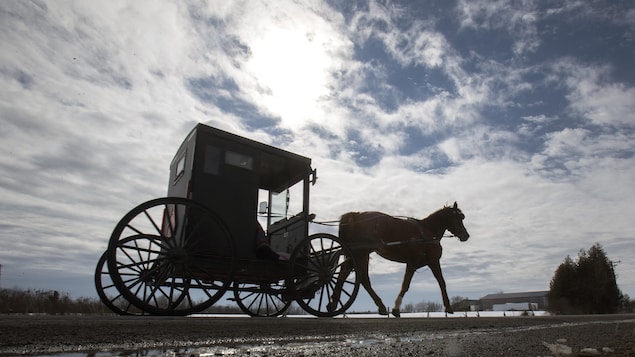
Des familles mennonites entendent fonder une communauté dans le comté de Kent, au Nouveau-Brunswick.
Ces résidents de Lucknow, en Ontario, font des démarches pour acquérir environ 1000 acres de terres agricoles et forestières.
Ils ont visité le coin la première semaine de novembre et on fait plusieurs offres d’achat à des propriétaires de la région d’Acadieville.
La relève n'est pas là
Ce n’était pas leur première visite, dit Roger Richard, propriétaire de la Ferme Pouce Vert, à Acadieville. Il a lui-même reçu des propositions, mais il ne veut pas vendre son entreprise familiale.
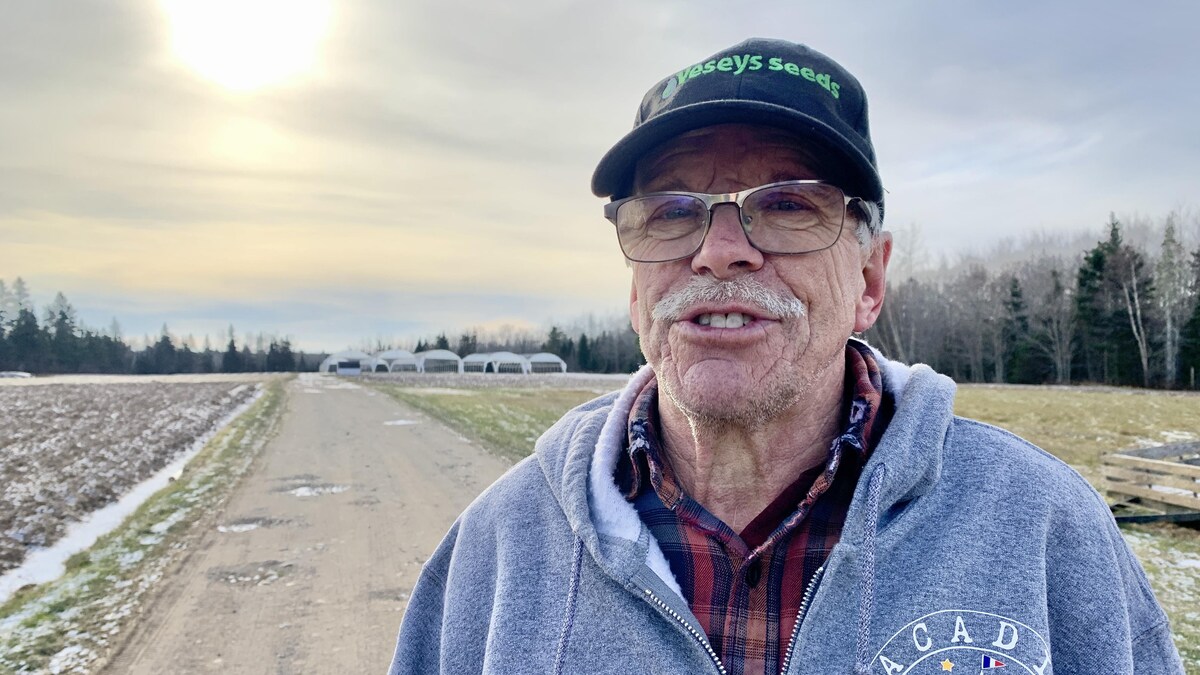
Le fait que sa
ferme soit en activité est attrayant pour les mennonites, croit-il, mais
ceux-ci avaient quand même beaucoup d’autres choix. Les terres présentement dans la région ne sont presque pas utilisées
, dit Roger Richard.
La région [où] les mennonites ont acheté, c'étaient des très bonnes terres agricoles. Mais depuis plusieurs années, elles ne sont pas utilisées, puis c'est pas les gens locaux, malheureusement, qui vont les utiliser.
C'est
de bonne guerre que ces gens-là reprennent des terres qui étaient en
opération, puis qui vont pouvoir faire de la production agricole
, déclare-t-il. La relève est pas là
.
Selon Paul Lang, directeur général de la Commission de services régionaux de Kent, jusqu’à six familles mennonites pourraient s’établir dans la région en 2025.
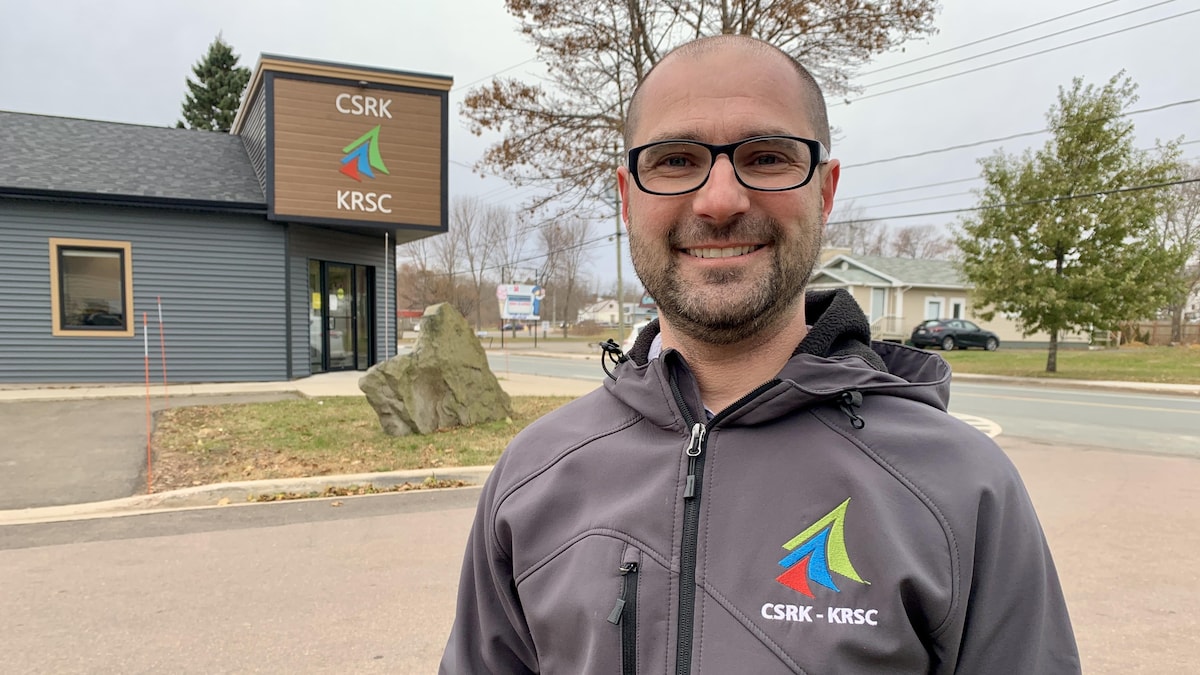 Paul Lang est directeur général de la Commission de services régionaux de Kent.
Paul Lang est directeur général de la Commission de services régionaux de Kent.Pour
établir une communauté [mennonite], ça en prend six [familles], alors
on s'attend qu'avec les 1000 acres qu'ils ont acheté, que d'autres
familles suivront par la suite
, explique-t-il.
Les mennonites intéressés par la région de Kent sont du « Vieil Ordre » des mennonites, et ils ne permettent pas l’usage de l'automobile. Il faudra donc prévoir quelques accommodements, comme des piquets pour qu’ils attachent leurs chevaux devant la banque, le bureau de poste ou la coop de Rogersville.
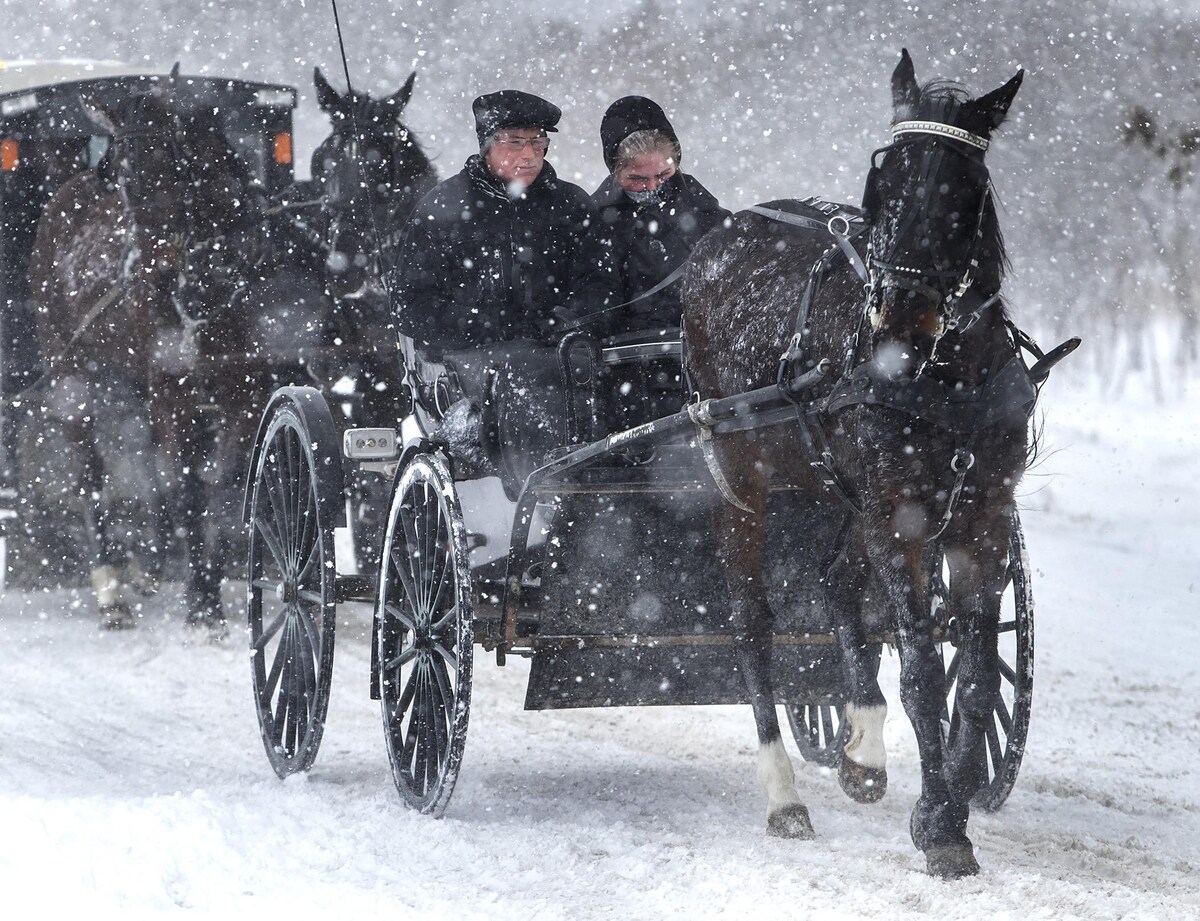 Des mennonites conduisent leurs carrioles dans un blizzard à Lindsay, en Ontario, le 27 février 2022.
Des mennonites conduisent leurs carrioles dans un blizzard à Lindsay, en Ontario, le 27 février 2022.On
rencontre le conseil municipal [de Nouvelle-Arcadie] prochainement pour
établir un plan de communication auprès de la population
, mentionne Paul Lang.
C'est des gens qui veulent être de bons voisins. Ils veulent contribuer à l'économie locale par l'agriculture, par leurs métiers. Ils travaillent le bois, ils travaillent l'acier.
Il explique avoir aussi visité ces communautés en Ontario pour s'informer sur leur mode de vie et les informer de la vie au Nouveau-Brunswick.
Adaptation et intégration
Ailleurs dans le monde, l’installation de ces congrégations anabaptistes — dont font aussi partie les amish et les huttérites — ne s’est pas toujours faite sans heurts.
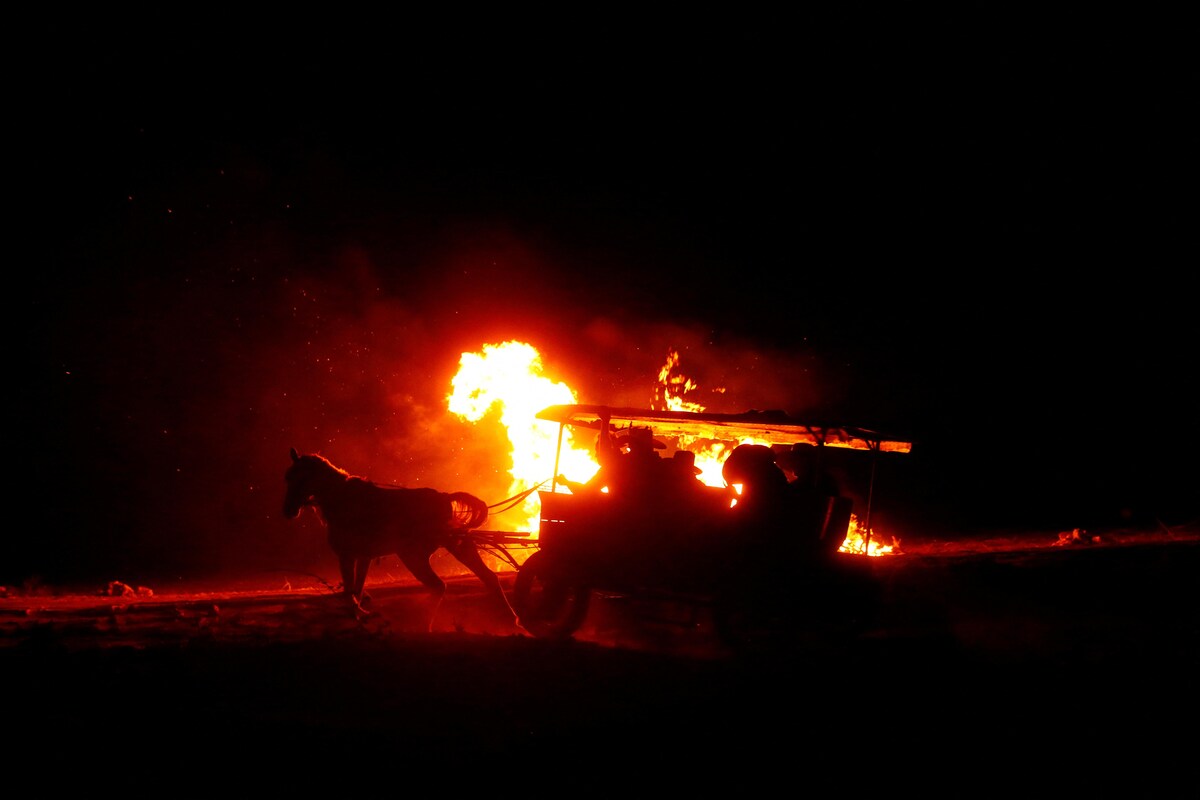 Une
carriole mennonite passe devant des arbres que l'on brûle pour faire
place à un champ à cultiver, le 29 avril 2021 à Valle Nuevo, au Mexique.
Selon Global Forest Watch, 8000 kilomètres carrés de forêt ont été
perdus en 20 ans dans l'État mexicain du Campeche.
Une
carriole mennonite passe devant des arbres que l'on brûle pour faire
place à un champ à cultiver, le 29 avril 2021 à Valle Nuevo, au Mexique.
Selon Global Forest Watch, 8000 kilomètres carrés de forêt ont été
perdus en 20 ans dans l'État mexicain du Campeche.Selon des organismes de défense de la forêt amazonienne, les communautés mennonites ont détruit depuis 2017 environ 4000 hectares de forêt (Nouvelle fenêtre) au Pérou.
La
déforestation orchestrée ces dernières années par les communautés
d’agriculteurs mennonites au Mexique — ou leur gestion de la terre
diffère grandement de celles des autochtones — a été qualifiée de désastre écologique (Nouvelle fenêtre)
.
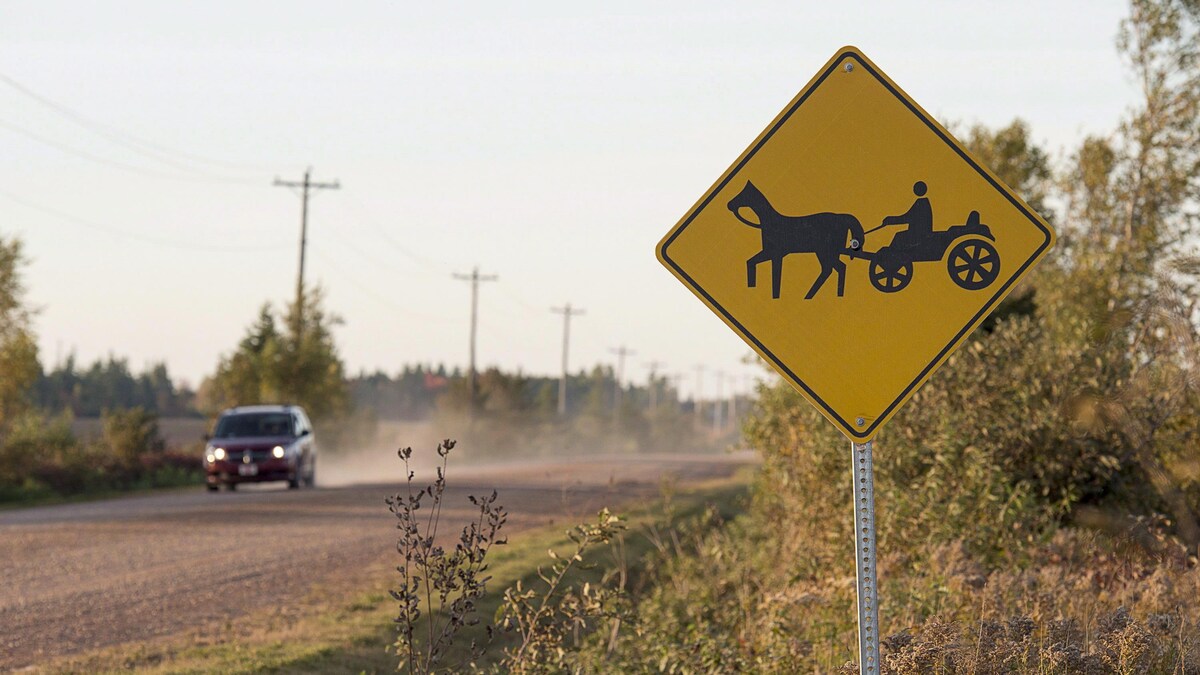 Un
panneau routier le 8 octobre 2016 à Summerville, à
l'Île-du-Prince-Édouard, indique aux automobilistes la possibilité de
croiser des charrettes tirées par des chevaux.
Un
panneau routier le 8 octobre 2016 à Summerville, à
l'Île-du-Prince-Édouard, indique aux automobilistes la possibilité de
croiser des charrettes tirées par des chevaux.La question des écoles mennonites, jugées illégales par le gouvernement du Québec, s’est aussi avérée problématique dans le passé. Paul Lang n’anticipe pas que cela soit une difficulté au Nouveau-Brunswick.
Qu’est-ce qui attire les mennonites ontariens?
L’agronome à la retraite Gerard Thebeau estime que la qualité de la terre et le relief relativement plat — donc qui facilite le déplacement des chevaux — font partie des raisons qui attirent ces acheteurs ontariens.
 Gerard Thebeau est agronome à la retraite.
Gerard Thebeau est agronome à la retraite.Paul Lang, de son côté, souligne que la proximité des services était un critère important pour ces personnes qui se déplacent à cheval.
L’attrait majeur, toutefois, serait le prix compétitif des terres agricoles du Nouveau-Brunswick.
C'est
sûr que le coût des terres est nettement inférieur à celui de
l'Ontario. On parle ici d'une bonne terre agricole, environ 2000 $ de
l'acre. En Ontario, ça peut se vendre à 20 000 $ de l'acre
, dit Paul Lang.
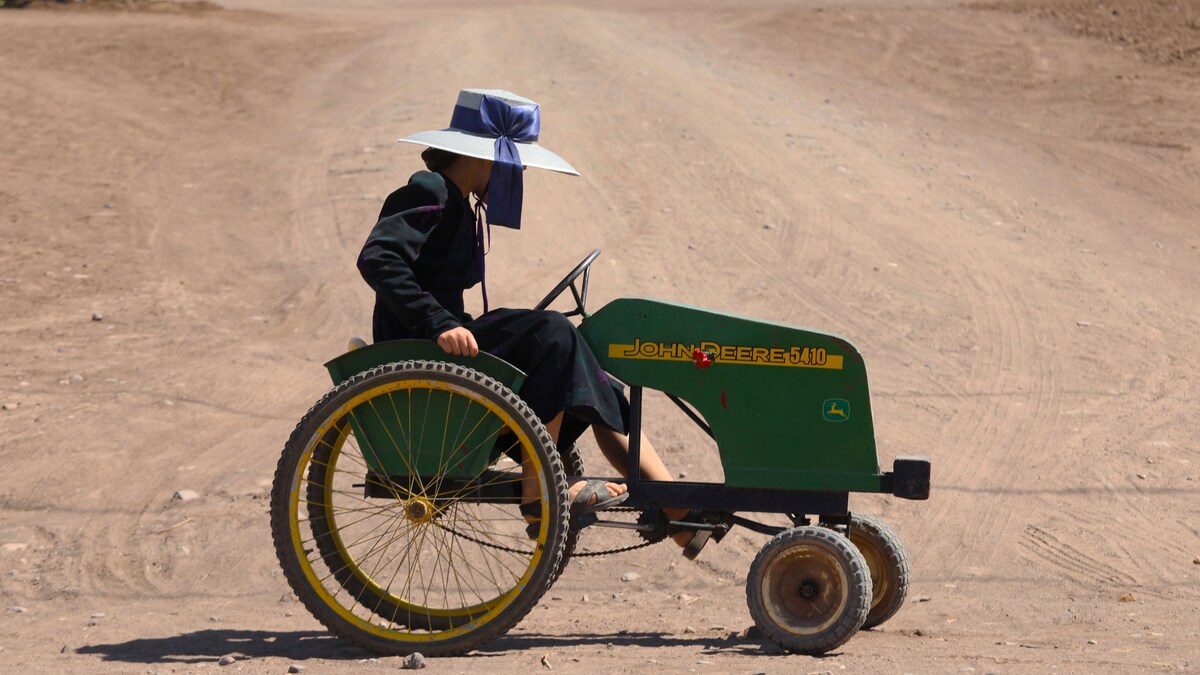 Une mennonite conduit un quadricycle à Ascensión, dans l'État de Chihuahua, au Mexique, le 26 septembre 2020.
Une mennonite conduit un quadricycle à Ascensión, dans l'État de Chihuahua, au Mexique, le 26 septembre 2020.Les mennonites ne peuvent plus prendre d'expansion en Ontario, parce qu’ils ne peuvent plus compétitionner
, selon Gerard Thebeau.
Ce dernier précise que ces terres ne seraient pas rentables avant au moins trois ans, puisqu’elles n’ont pas été labourées depuis une quarantaine d’années, depuis la fin des années de gloire du chou de Bruxelles au Nouveau-Brunswick.

Des terres à cultiver
Gerard Thebeau espère que la venue de ces agriculteurs mennonites contribuera à une meilleure souveraineté alimentaire dans la région.
Selon le ministère de l'Agriculture du Nouveau-Brunswick, la province est très dépendante des importations de nourriture et ne produit que 7 % des légumes (excluant les patates) que les Néo-Brunswickois consomment.
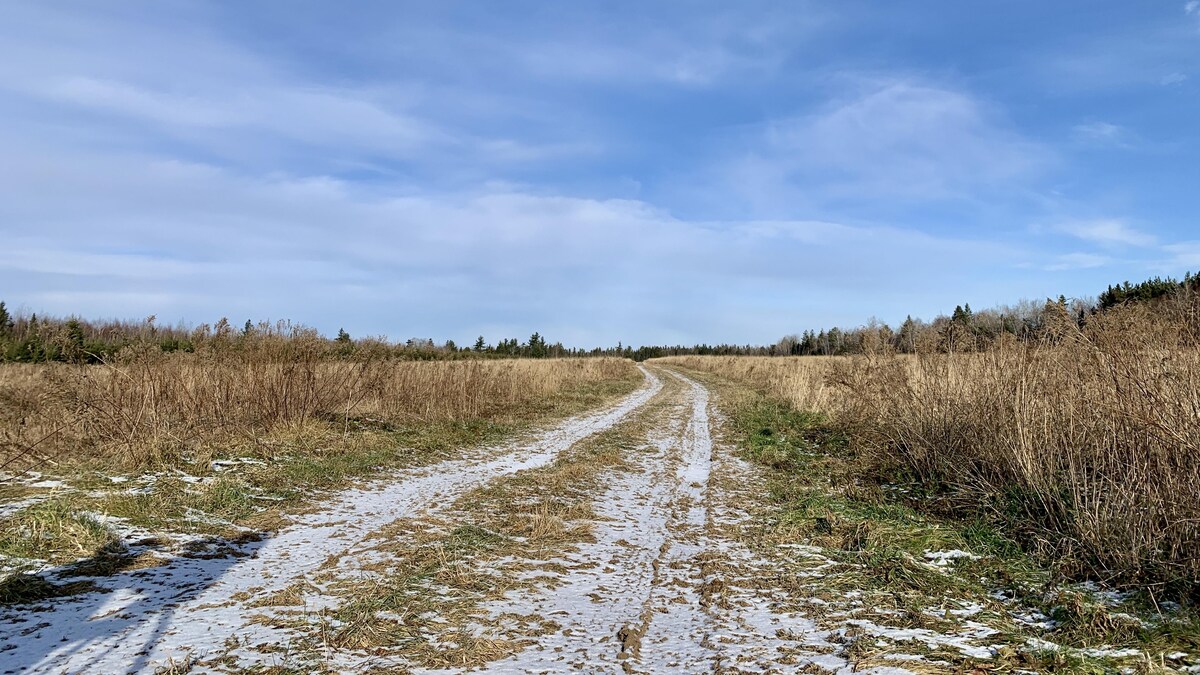 Beaucoup de terres agricoles ne sont plus exploitées dans la région de Kent.
Beaucoup de terres agricoles ne sont plus exploitées dans la région de Kent.On
est à court de céréales, à court de boeuf. Ces gens-là vont essayer de
remplir des vides qu'on a [et] que notre population n’est pas en mesure
de remplir
, ajoute Gerard Thebeau. On espère que ce sera une banque de nourriture à long terme.
D’après le reportage de Nicolas Steinbach

He sad that it’s not the locals who are farming but welcomes the new residents openly.